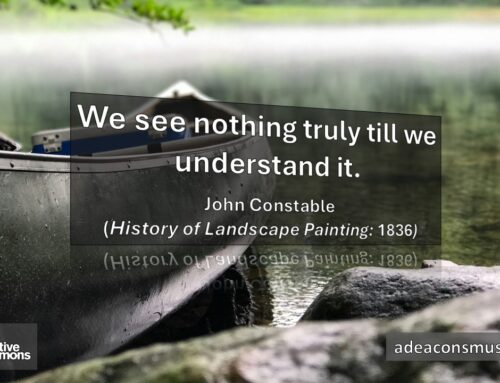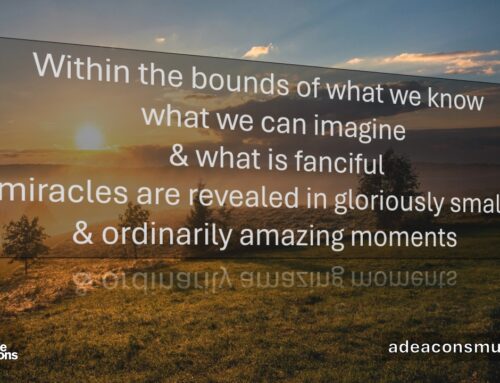I love alliteration … I also had not anticipated blogging with 3S & 1R: Spiritual, Sabbath, Self-Care & Religious. In fact, I had thought I would be adding a new addition to the Serial Story Feather's Fall (thanks for the recent inquiries about an update: next week … I hope J )! But then a great twitter conversation occurred about Sabbath and Self-care, which then moved onto the ongoing faith discussion about a person being spiritual but not religious … and thus a blog was born!
My take away from this twitter conversation is that we – as church – have done a rather poor job of translating our words into a context – the secular – that pretty much is longing for them. So (for instance) in this 24/7 economy, in which temporary and part-time jobs mean less financial security, there is often little time for family or self. As a result, the idea of self-care is gaining in importance.
Now in church-ese we call that Sabbath. This rich and nuanced word contains rich history of social and economic justice, which is tied to the earth and agriculture (Creation in church-speak). And we know from multiple studies, these church values are shared by the secular context that talks about self-care. Problem though – here's the rub – is we're not even in the conversation (often). Self-care often is individualistic and self-focused. In fact, it mirrors the consumer culture in which we live and is often approached as a product in and of itself. And – since we are not in the conversation – we have little space to connect that the church language of Sabbath carries another shared value: community and corporate well-being!
From Sabbath and Self-Care, the conversation that inspired this blog then moved on to discuss the phrase/movement of spiritual but not religious. A phrase that often irks those in the church and too often gets dismissed and/or judged. And I think this is unfortunate.
Since we are often not in the conversation or find ourselves only speaking to one another (within our context) and not those who are seeking (the spiritual part), we have done a poor job to address this reality: spiritual seeking itself has been turned into a commodity and leaves it to the individual to put together a system of ritual, practice and discipline: in essence people are creating their own religions (often individual in focus). And – often – without an anchored tradition, sometimes such religious formation leaves a spirituality that is unable to weather some of life's very real and traumatic realities. I do not claim that formal or institutional religion always does this well – but the communal tradition leaves space for support individualism cannot (in my experience).
As this twitter chat came to an end, I was excited both by the trust being shared and the public nature. For those who aren't familiar with Twitter, this is all public. Currently the Presbytery has a reach of 1200+ Followers and the person with whom I was exploring these great ideas and appropriate challenges has many as well! Public discussion of faith is great!
And here's the final take away: if we are currently not in the conversation, need alone participating publicly (Church-ese might go as far as calling this Evangelism) then not only do we need to ask whether we are relevant, but do we have any moral or ethical stance on which to judge? I think that reality is we do tend to judge – and I'd challenge that's easy to do when you aren't in the game, need alone even on the sidelines …








Spiritual but not religious is something I hear quite often from different friends. There is a distancing from what they perceive as overbearing religious entities.
How do you feel they would define ‘overbearing?’ It’s defiantly not an uncommon experience, which is most unfortunate. It also does certainly affect the SBNR response to formal and institutionalised religion.
Jumping in while simultaneously outting myself that I was the one this conversation was had with ;).
For context, I must preface this with a few things–set the stage, if you will:
-I grew up in a probably more-atheist-than-agnostic home
-I didn’t attend church at all until I was 15. (Of my own choice, with a friend.)
-This was over a year after I went through the interesting process of exploring-God-for-the-first-time and then surrendering-myself-to-Jesus-instead-of-succumbing-to-myself. Start to finish, this bit took six weeks.
-I went to a bunch of churches (look–I didn’t even consider myself a Christian until I was filling in a social studies assignment and a friend asked if I believed in God, and I said yes, and she told me to colour the thing orange… That makes self-identification very confusing…) I stayed at a few for 6+ months, a couple for over a year. My heart is really in the United Church, but I felt the most freedom to be my messed-up self at The Meeting Place, except that while I enjoyed the freedom to dance and put my hands in the air, and they were mostly chill about stuff, I don’t fully jive with everything in the statement of faith.
-I currently do not attend church. I’m mostly okay with this.
-I have a degree in physical and health education [which is pretty unrelated to the above but related to the main point]
So, just as “religion” is beyond/bigger than “church”, “spirituality” is beyond/bigger than “religion”. I do not necessarily consider myself religious, though I’d still (I suppose), consider myself a Christian. (Rather, my Facebook “Religious Views” section says ‘i worship JESUS.’) Realistically, I think I just don’t like putting complex things in little boxes, because sometimes that separates people from things based on a preconceived expectation and not a personal desire. Linking that back to the concept of self-care, I would build my own understanding of self-care from my academic rather than spiritual pursuits, being, I would aim to define self-care as encompassing of physical/emotional/spiritual/social/environmental/occupational elements of life, and a simultaneous building-of-and-recovery-from such elements as being related to self-care–keeping all of the above in balance, as you define that balance to be. For example, some people will choose to allow spiritual self care (whether they define that within Christianity, Judaism, etc., or a broader sense of spiritual self/world-connection, or a combination of the two–for instance, given the above, I’ve been practicing mindfulness meditation for about a month now maybe, but don’t see that as religious in any form, nor overlapping with my faith, but as self-/world-connection as many who practice yoga within a secular realm see yoga); i see it as an act of self-care that is spiritual but not religious; but then, I may perhaps also choose to see prayer as spiritual-but-not-religious as well (personal grey area right there–I am not sure on where I fall on that last statement ;).) As we discussed, many people may see attending church as an act of community self-care, but I think (especially in the chaos of everyday life!) that taking time for individual self care is equally important, and something that everybody can do, even if they do not belong to a specific religious group/community. I remember one night back in probably 2012, I was at TMP on a youth retreat doing one-on-one for the first time (and on a youth retreat for the first time–exhausting on all fronts those are), and after the girl I was shadowing was asleep, I just laid down on my bunk after a chaotic day and hit play on my iPod, with Uncle Bobby by Flyleaf playing: “In the middle of all the busyness / A call to be still. / Multitude of words: / Quiet, be still.” Repeatedly. Because those were the words I needed in that moment, and words I think pretty much everybody needs far more often in the midst of our chaotic lives.
We discussed last week how we might better facilitate the self-care discussion between Christian/religious/SBNR/atheist[/etc.] communities–I think the answer is to first better understand what we mean by self-care, and how it can be applied to all. It’s going to look different for everybody, but I think the important thing is getting even five minutes of focused self-care time in for the people who truly think they don’t have time for it. The people who are setting aside time to engage with faith communities are, hopefully, using this as self-care time: so how do we expand our understanding of self-care to encompass everybody, and make even those who are already spiritual/religious see self-care in a more holistic/broad fashion? So, we’ve determined we’re not getting everybody in church, thus, first, we need to find the place to have that discussion among interested parties. Because if nothing else, this could be a way to bridge the gap between the secular/spiritual/religious and build a less-bound-by-boxes-that-divide community.
[And maybe, you know, lower stress-related cardiovascular disease or obesity risk simultaneously–if little else in terms of community cohesion.]
PS. I should really just respond by blog post sometimes 😉
Kerri,
Thanks so much for this! Sharing our stories – in my experience – is how understanding begins! And yours helps indeed imagine what that bridge might look like! As for the PS – sounds like you just wrote this week’s blog for Kerri on the Prairies! : ) http://kerriontheprairies.com/ (Yes: shameless plug for your great blog 😉 )
It’s funny. I read your response several hours ago before I saw my own response which I’d written earlier pop up. First of all, I didn’t have time to read the full blog just now, I notice that you discuss asthma. Well, there you have it! I’ve been in the ol’ oxygen tent myself due to our mutual friend. <.< Anyway, I've had my own deep and persistent trials of faith. You can probably tell that because I'm a Roman Catholic in California who uses a UCiM deacon as his confessor and confidante. lol I don't want to boggart this discussion, but I would like to point out that I don't see this as a matter of self care *or* spiritual or religious conviction. I have been far more engage in caring for myself over the past few year or so, and part of that has *been* reconnection with my Christian faith. Just as an aside, I guess, but I do get what you say about understanding what we mean by self care. After all, self care doesn't necessarily or even primarily mean selfishness.
Thanks again Daniel!
I think another thing confronting a discussion about any of these words – Spiritual, Religious, Self-Care, and Sabbath – as only examples, is what do we actually mean?
It often seems that we are so isolated form engaging in these discussions that we never ask: is the word we are using mean the same thing to each of us? If not, how can we find what that might mean together in order to then have a generative conversation. Does that make sense?
It makes sense at least to me. Until we find some way to convey raw thoughts, we’re simply forced to make do with the archaic but oh so useful medium of speech. lol An imperfect medium for imperfect beings.
Thanks Daniel,
I think this one of the challenges that arises in this post-modern context: relativism and individuality. How we bridge the a conversation about community as a place in which spirituality can be explored feels important. Otherwise – as you have said -t he worry of seeing ourselves (narcissism?) can be a tension.